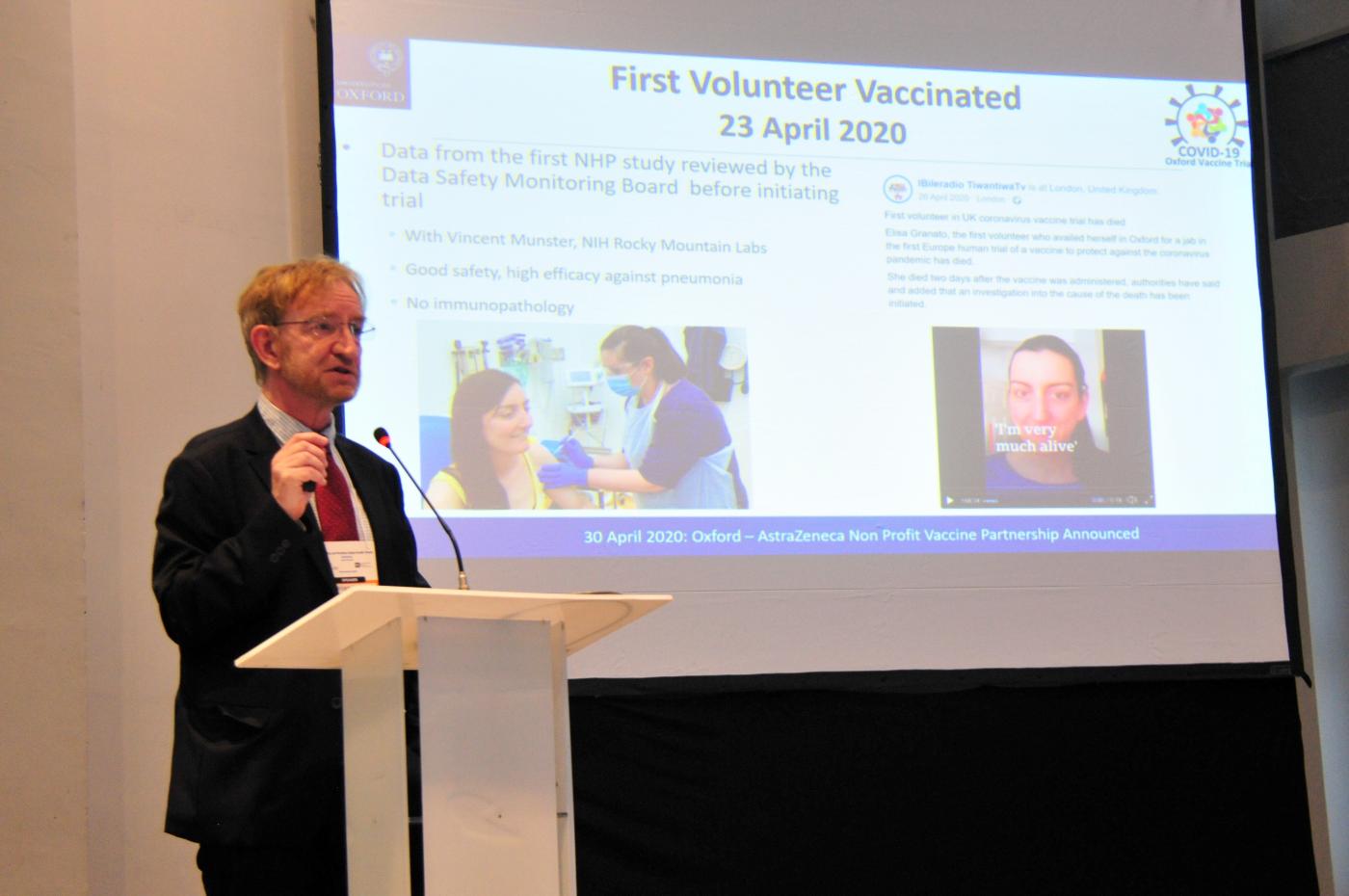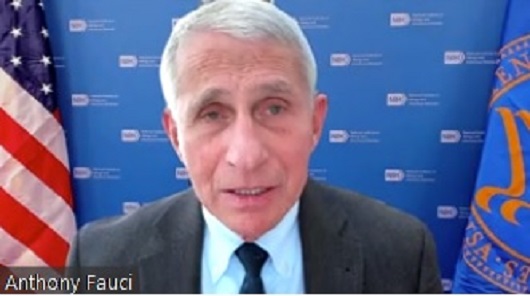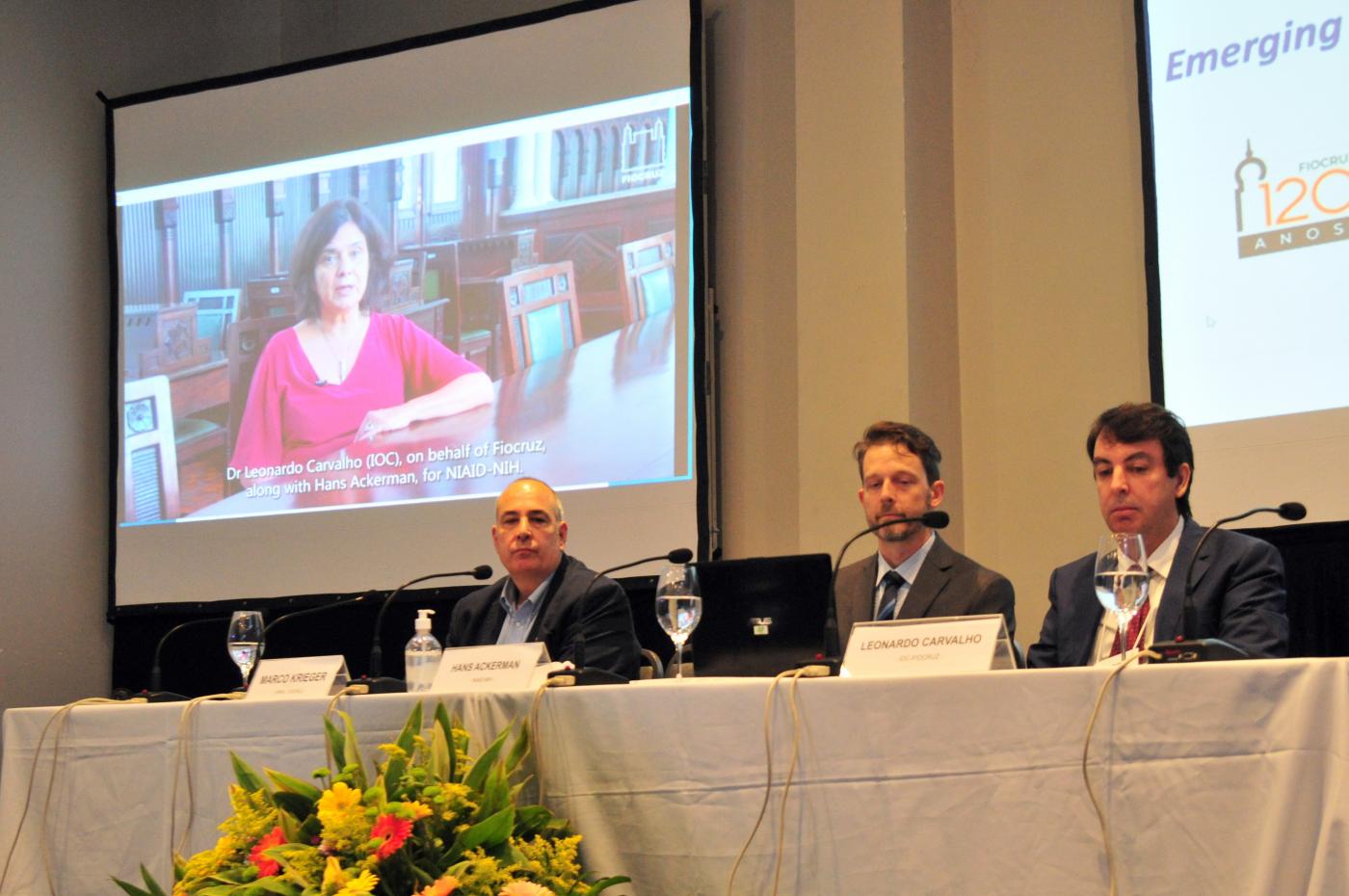Fiocruz/NIH Symposium: COVID-19 demands new ways to distribute vaccines
28/04/2022
Cristina Azevedo (Fiocruz News Agency)
“There are many nuclear missiles in the world. Why don’t we have enough plants to produce vaccines?” The demand came from Adrian Hill, director of the Jenner Institute, of the University of Oxford. One of the main developers of the Oxford/AstraZeneca COVID-19 vaccine, Hill attended the Symposium on Emerging and Persisting Global Health Threats, organized by Fiocruz and by the National Institute of Allergy and Infectious Diseases/National Institutes of Health (NIAID-NIH), held on April 24 and 25. The event, which took place in Rio de Janeiro, was also attended by the likes of Anthony Fauci, the main American epidemiologist and leader of the US task force against the pandemic, and Celina Turchi, researcher of the Aggeu Magalhães Institute - Fiocruz Pernambuco, who first established a link between zika and microcephaly in babies.
Adrian Hill: "New distributive models are needed" (Image: Pedro Paulo Gonçalves)
Initially intending to celebrate the long history of cooperation between Fiocruz and NIAID/NIH, the symposium was supposed to have happened two years ago, but was postponed by the pandemic and acquired a new meaning. Organizers Leonardo Carvalho, a researcher of the Oswaldo Cruz Institute (IOC/Fiocruz), and Hans Ackerman, of the National Institute of Allergies and Infectious Diseases (NIAID-HIH), highlighted that the event intended to strike a balance between emerging diseases and those that have been affecting humankind for decades or even centuries.
New models
At the Hotel Prodigy Santos Dumont, Hill said that despite the 6 million deaths that were officially recorded, the number of victims of the COVID-19 can be up to 20 million, due to under-notification. He criticized unequal access to vaccines throughout the world, mentioning that last year “74% of the US population were immunized, as opposed to only 4% of the population of Sub-Saharan Africa”. In order to modify this scenario, he defended a search for new models.
According to Hill, the cooperation of the University of Oxford with research centers in other parts of the world, with both pharmaceutical companies and governments, was a key factor to develop clinical trials and producing the vaccine in record time. In Brazil, for instance, the Oxford/AstraZeneca vaccine is produced by Fiocruz thanks to an agreement that included technology transfer.
“Oxford has had a plant to make vaccines for 25 years and was already using this technological platform [of non-replicant viruses obtained from chimpanzee adenovirus] in the research of a malaria vaccine. But our plant would not be able to produce in scale”, he said. “We need a new distributive model. AstraZeneca coordinated its efforts with those of 20 plants in 15 countries. Today, this vaccine is applied in 184 countries and at a very low cost”, said Hill. On Thursday, Hill visited the Immunobiological Technology Institute (Bio-Manguinhos/Fiocruz), where the COVID-19 vaccine is produced in Brazil, and the next day, he attended the National Meeting of Malaria Research, presenting the studies of a new vaccine against this disease, with an efficacy of 77%.
Some days later, Hill was honored at Fiocruz, where he was given a plaque in gratitude to him and his university team for the development of the Oxford/Astrazeneca vaccine, today produced 100% nationally at the Institute of Technology in Immunobiological (Bio-Manguinhos/ Fiocruz), after technology transfer.
Anthony Fauci: "COVID-19 will not be eradicated" (Image: Pedro Paulo Gonçalves)
Also in the symposium, Fauci, director of the NIAID, believes that, in spite of the deceleration of cases, COVID-19 will not be eradicated. “Measles was eradicated [in the USA] because it had no animal repository and because the vaccination campaign was well accepted”, he observed, mentioning that today that are those who don’t trust vaccines. “I foresee difficulties getting to the control phase, when levels will be so low that they will no longer paralyze everyday life”, he said. “We need to be gentle but firm to convince those who don’t trust vaccines”, he stated.
The main epidemiologist of the American presidency also highlighted the need to not allow the disease to be forgotten. “It’s up to the scientific community to remind people that the pandemic is not a new phenomenon, that it happens many times. I hope the lessons learned over the past two years of so much pain will help us in the upcoming years.”
Legacy
The symposium was not restricted to COVID-19. While opening the meeting, Fiocruz president, Nísia Trindade Lima, said in a video message that she hopes the event, together with the XVI National Meeting of Malaria Research (which was launched on April 25, at a joint session), “will bring great contribution to research and strengthen the role of scientific institutions in the fight against the great public health issues, involving biomedical, environmental and social aspects.”
Krieger, Ackerman and Carvalho watch Nisia's message (Image: Pedro Paulo Gonçalves)
Marco Krieger, vice-president of Production and Innovation in Health for Fiocruz, highlighted the 122 years of the institution, created last century to deal with outbreaks of diseases such as measles, bubonic plague, and yellow fever. He stated that although this was not the beginning of scientific activities in Brazil, it marked the moment at which “for the first time, Brazilian society saw it could use science in real life”.
Krieger showed that the Foundation works from basic research to the production of vaccines and medicines, including medical assistance, in a great “health ecosystem”. “The Immunobiological Technology Institute (Bio-Manguinhos/Fiocruz) has faced many outbreaks since its creation, from meningitis vaccines to COVID-19”, he said, adding that last year 253 million doses of vaccines, in general, were delivered - of these, 153 million were against COVID-19. “Today we have more than 11 vaccines in our portfolio, and we are responsible for more than half of the vaccines used in the National Vaccines Program.”
Subjects such as HIV, arboviruses, dengue fever, and others, in addition to malaria, were also addressed. Celina Turchi, for instance, drew attention to the fact that zika seems to have been forgotten, although the virus is still in circulation. Last year alone there were 800 suspected cases of congenital zika syndrome. “Zyka has gone away as an emergency, but not as a threat”, she said. “We need a vaccine against zika”.
Beatriz Grinssztejn, of the Evandro Chagas National Institute for Infectious Diseases (INI/Fiocruz), emphasized how HIV has been gaining terrain among young men who have sex with other men and with transgender women. 2.1 million people with HIV live in Latin America today. Of these, almost one million are in Brazil. Many discover the condition late and cannot benefit from therapy as they could have otherwise. The researcher also presented the project to implement Pre-Exposure Prophylaxy (PrEp) in injectable form in Brazil, using extended-release Cabotegravir, which will be financed by Unitaid, a global health agency linked to the World Health Organization (WHO).
The symposium went straight on to Monday, when the National Meeting of Malaria Research took place, in a joint session, showing how diseases of the past still affect populations in the present.



